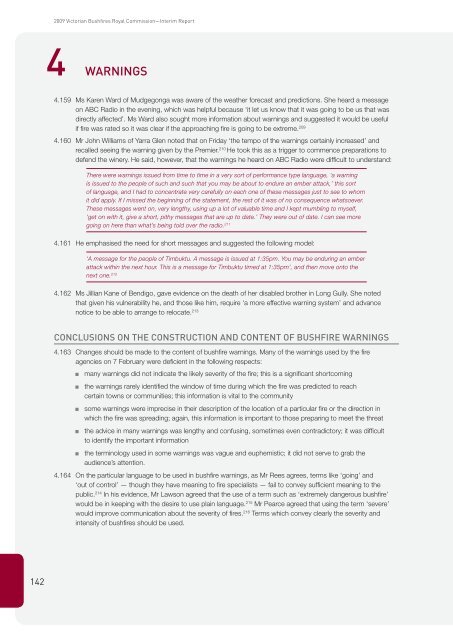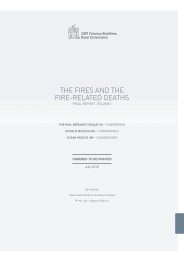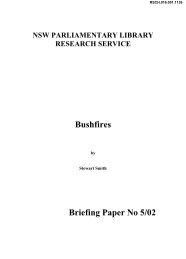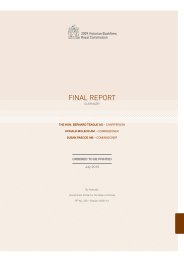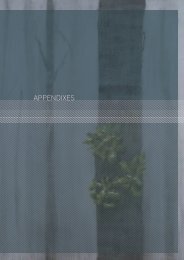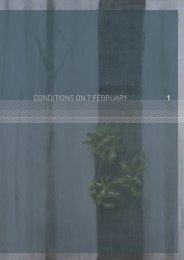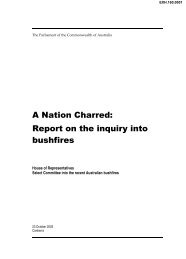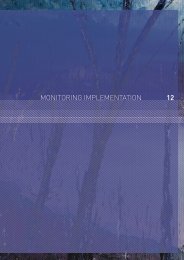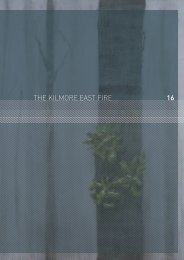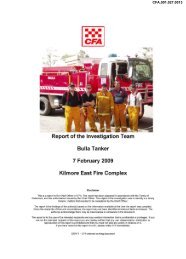Chapter 4 - Warnings - 2009 Victorian Bushfires Royal Commission
Chapter 4 - Warnings - 2009 Victorian Bushfires Royal Commission
Chapter 4 - Warnings - 2009 Victorian Bushfires Royal Commission
Create successful ePaper yourself
Turn your PDF publications into a flip-book with our unique Google optimized e-Paper software.
<strong>2009</strong> <strong>Victorian</strong> <strong>Bushfires</strong> <strong>Royal</strong> <strong>Commission</strong>—Interim Report<br />
4 WARNINGS<br />
4.159 Ms Karen Ward of Mudgegonga was aware of the weather forecast and predictions. She heard a message<br />
on ABC Radio in the evening, which was helpful because ‘it let us know that it was going to be us that was<br />
directly affected’. Ms Ward also sought more information about warnings and suggested it would be useful<br />
if fire was rated so it was clear if the approaching fire is going to be extreme. 209<br />
4.160 Mr John Williams of Yarra Glen noted that on Friday ‘the tempo of the warnings certainly increased’ and<br />
recalled seeing the warning given by the Premier. 210 He took this as a trigger to commence preparations to<br />
defend the winery. He said, however, that the warnings he heard on ABC Radio were difficult to understand:<br />
There were warnings issued from time to time in a very sort of performance type language, ‘a warning<br />
is issued to the people of such and such that you may be about to endure an ember attack,’ this sort<br />
of language, and I had to concentrate very carefully on each one of these messages just to see to whom<br />
it did apply. If I missed the beginning of the statement, the rest of it was of no consequence whatsoever.<br />
These messages went on, very lengthy, using up a lot of valuable time and I kept mumbling to myself,<br />
‘get on with it, give a short, pithy messages that are up to date.’ They were out of date. I can see more<br />
going on here than what’s being told over the radio. 211<br />
4.161<br />
He emphasised the need for short messages and suggested the following model:<br />
‘A message for the people of Timbuktu. A message is issued at 1:35pm. You may be enduring an ember<br />
attack within the next hour. This is a message for Timbuktu timed at 1:35pm’, and then move onto the<br />
next one. 212<br />
4.162 Ms Jillian Kane of Bendigo, gave evidence on the death of her disabled brother in Long Gully. She noted<br />
that given his vulnerability he, and those like him, require ‘a more effective warning system’ and advance<br />
notice to be able to arrange to relocate. 213<br />
conclusions on the construction and content of BUSHFIRE warnings<br />
4.163 Changes should be made to the content of bushfire warnings. Many of the warnings used by the fire<br />
agencies on 7 February were deficient in the following respects:<br />
■■<br />
many warnings did not indicate the likely severity of the fire; this is a significant shortcoming<br />
■■ the warnings rarely identified the window of time during which the fire was predicted to reach<br />
certain towns or communities; this information is vital to the community<br />
■■ some warnings were imprecise in their description of the location of a particular fire or the direction in<br />
which the fire was spreading; again, this information is important to those preparing to meet the threat<br />
■■ the advice in many warnings was lengthy and confusing, sometimes even contradictory; it was difficult<br />
to identify the important information<br />
■■ the terminology used in some warnings was vague and euphemistic; it did not serve to grab the<br />
audience’s attention.<br />
4.164 On the particular language to be used in bushfire warnings, as Mr Rees agrees, terms like ‘going’ and<br />
‘out of control’ — though they have meaning to fire specialists — fail to convey sufficient meaning to the<br />
public. 214 In his evidence, Mr Lawson agreed that the use of a term such as ‘extremely dangerous bushfire’<br />
would be in keeping with the desire to use plain language. 215 Mr Pearce agreed that using the term ‘severe’<br />
would improve communication about the severity of fires. 216 Terms which convey clearly the severity and<br />
intensity of bushfires should be used.<br />
142


